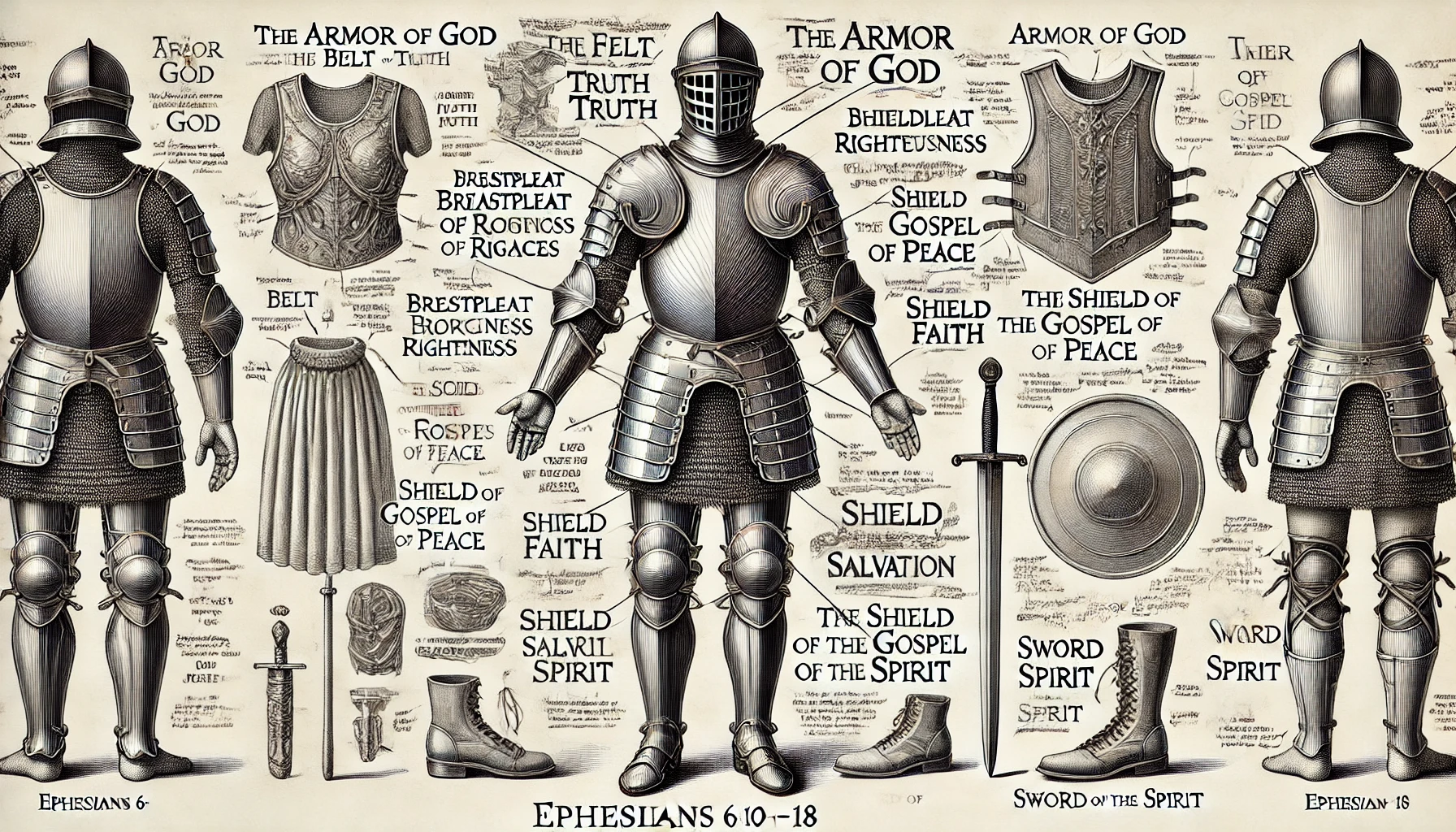Christian Living and Spiritual Warfare: An Exegesis of Ephesians 4-6
Table of Contents
Introduction
Ephesians 4-6 contains some of the most practical and instructive passages in the New Testament regarding Christian living, unity in the Church, and the concept of spiritual warfare. The Apostle Paul’s letter to the Ephesians, particularly these chapters, addresses the ethical implications of the Christian faith, focusing on how believers are to live in light of their new identity in Christ. One of the most profound sections is the “Armor of God,” found in Ephesians 6, which serves as a metaphor for the spiritual defenses necessary to withstand the challenges posed by evil forces.
Unity and Maturity in the Body of Christ (Ephesians 4)
Paul begins Ephesians 4 by urging believers to live in a manner worthy of their calling, with an emphasis on virtues such as humility, gentleness, patience, and love. The call for unity within the body of Christ is a central theme, grounded in the shared faith and the one Spirit, Lord, and God who unites all believers.
Ephesians 4:3: “Make every effort to keep the unity of the Spirit through the bond of peace.”
Paul further elaborates on the diverse gifts given to the Church, including apostles, prophets, evangelists, pastors, and teachers. These roles are intended to equip the saints for service and to build up the body of Christ, leading to unity in faith and maturity in the knowledge of the Son of God.
Ephesians 4:11-13: “So Christ himself gave the apostles, the prophets, the evangelists, the pastors and teachers, to equip his people for works of service, so that the body of Christ may be built up until we all reach unity in the faith and in the knowledge of the Son of God and become mature, attaining to the whole measure of the fullness of Christ.”
Imitating God and Living as Children of Light (Ephesians 5)
In Ephesians 5, Paul exhorts believers to imitate God by living a life of love, just as Christ loved us and gave Himself up for us. He warns against various forms of immorality, urging believers to live as “children of light,” demonstrating goodness, righteousness, and truth.
Ephesians 5:1-2: “Follow God’s example, therefore, as dearly loved children and walk in the way of love, just as Christ loved us and gave himself up for us as a fragrant offering and sacrifice to God.”
Paul continues by addressing relationships within the Christian household, particularly the relationship between husbands and wives. He uses the metaphor of Christ and the Church to illustrate the ideal of mutual love and respect within marriage. Husbands are called to love their wives as Christ loved the Church, and wives are called to respect their husbands.
Ephesians 5:22: “Wives, submit yourselves to your own husbands as you do to the Lord.”
Ephesians 5:25: “Husbands, love your wives, just as Christ loved the church and gave himself up for her.”
Spiritual Warfare and the Armor of God (Ephesians 6)
Ephesians 6 begins with further instructions on relationships, including those between children and parents, and between slaves and masters. Paul then transitions to a discussion of spiritual warfare, asserting that believers are engaged in a battle not against flesh and blood, but against spiritual forces of evil.
Ephesians 6:12: “For our struggle is not against flesh and blood, but against the rulers, against the authorities, against the powers of this dark world and against the spiritual forces of evil in the heavenly realms.”
The Armor of God

Figure 1: The Armour of God - Imagined technichal drawing
To stand firm against these forces, Paul instructs believers to “put on the full armor of God.” He uses the metaphor of a Roman soldier’s armor to illustrate the spiritual defenses necessary for the Christian life. Each piece of armor symbolizes a key aspect of spiritual readiness and defense:
- The Belt of Truth: Represents truthfulness and integrity, holding everything together in the life of a believer. Ephesians 6:14: “Stand firm then, with the belt of truth buckled around your waist.”
- The Breastplate of Righteousness: Symbolizes righteousness and moral purity, protecting the believer’s heart from evil. Ephesians 6:14: “With the breastplate of righteousness in place.”
- The Shoes of the Gospel of Peace: Signify readiness to spread the gospel and live in peace. Ephesians 6:15: “And with your feet fitted with the readiness that comes from the gospel of peace.”
- The Shield of Faith: Represents faith and trust in God, which can extinguish the enemy’s attacks. Ephesians 6:16: “Take up the shield of faith, with which you can extinguish all the flaming arrows of the evil one.”
- The Helmet of Salvation: Signifies the assurance of salvation, protecting the mind from doubt and despair. Ephesians 6:17: “Take the helmet of salvation.”
- The Sword of the Spirit: The Word of God, the only offensive weapon in the armor, used to combat lies and temptation. Ephesians 6:17: “And the sword of the Spirit, which is the word of God.”
- Prayer in the Spirit: Represents constant communication with God, essential for deploying all the other pieces of armor effectively. Ephesians 6:18: “And pray in the Spirit on all occasions with all kinds of prayers and requests.”
Conclusion
Ephesians 4-6 provides a comprehensive guide to Christian living, emphasizing unity, love, and the importance of spiritual preparedness. The “Armor of God” metaphor in Ephesians 6:10-18 is particularly significant, offering a vivid depiction of the spiritual resources available to believers as they navigate the challenges of life. Paul’s exhortation to “put on the full armor of God” underscores the reality of spiritual warfare and the need for believers to be vigilant and equipped, standing firm in the strength that God provides.